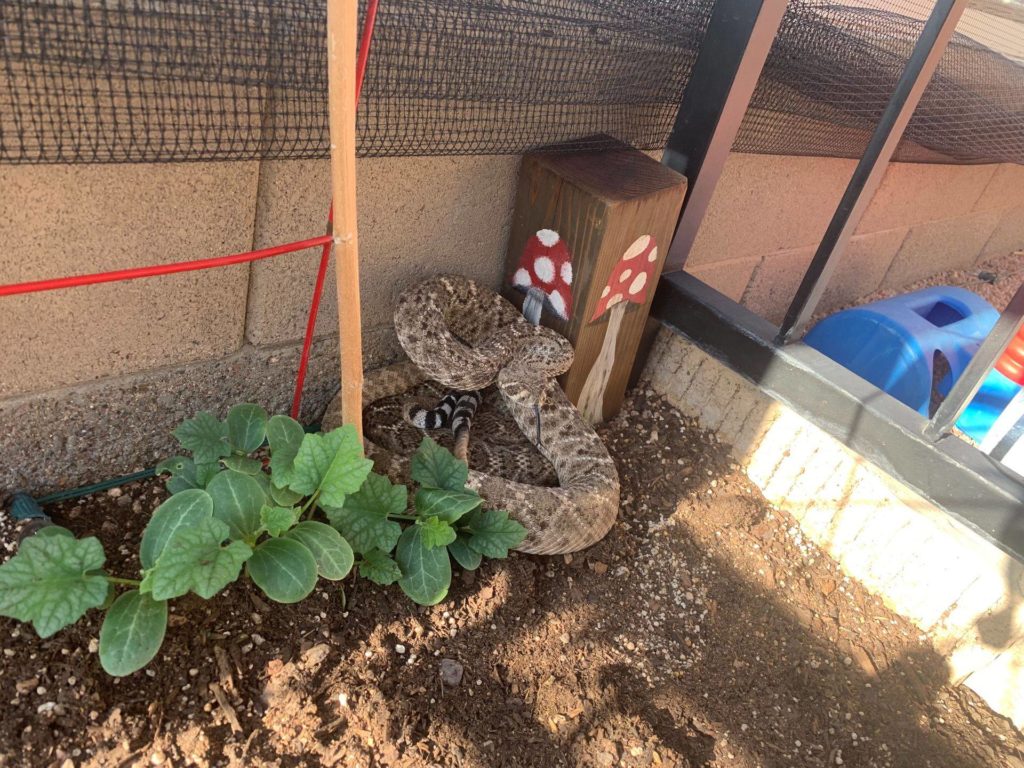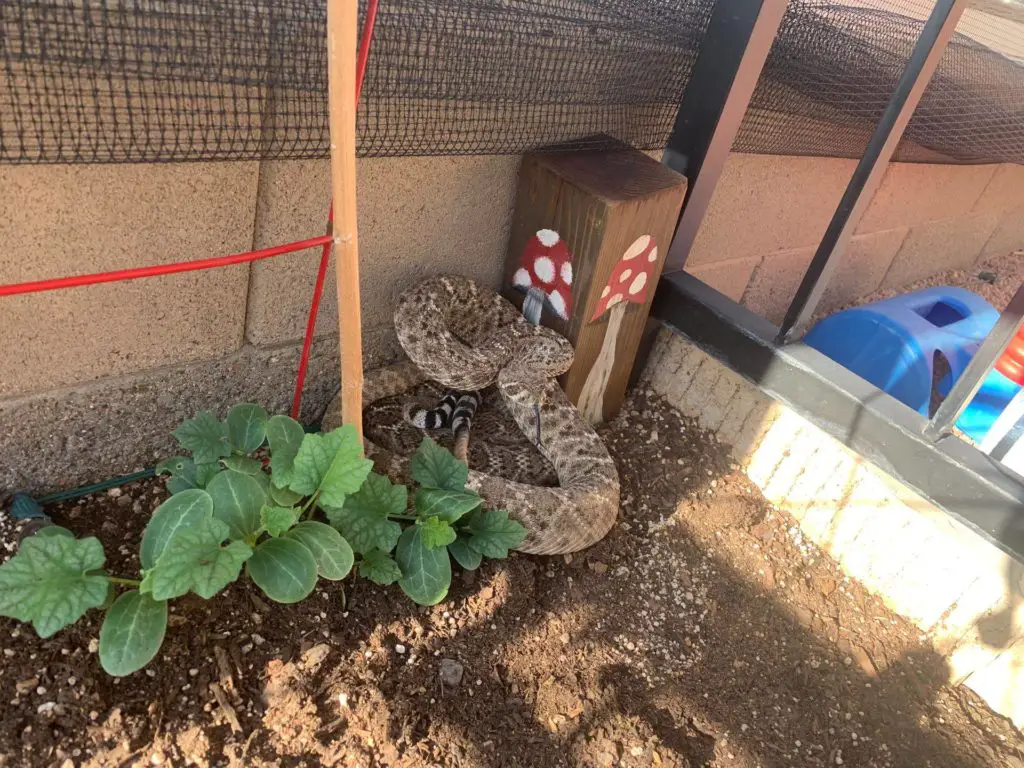Rattlesnakes can be a common problem for homeowners in areas where these venomous snakes are prevalent. These snakes pose a serious threat to human life and can lead to severe injury or even death. Therefore, it’s essential to take the necessary steps to keep these dangerous reptiles away from your home.
In this article, we’ll discuss some effective ways to keep rattlesnakes away from your property. From removing potential hiding spots to using natural deterrents, we’ll cover everything you need to know to prevent these snakes from entering your home and keep your family safe. So, let’s get started!
To keep rattlesnakes away from your home, you can take some preventative measures. Keep your yard free of debris and vegetation, seal off any gaps or holes around your home, and use snake-proof fencing. Remove any potential food sources, such as rodents or bird feeders. If you encounter a rattlesnake, keep a safe distance and call a professional to remove it.

Keeping Rattlesnakes Away From Your Home
Rattlesnakes are venomous snakes that can pose a serious threat to humans and pets. If you live in an area where rattlesnakes are common, it’s important to take steps to keep them away from your home and property. In this article, we’ll explore various methods for keeping rattlesnakes at bay.
1. Remove Attractive Habitat and Food Sources
Rattlesnakes are attracted to areas with ample food sources and shelter. To reduce the likelihood of snakes taking up residence around your home, you should eliminate or reduce their habitat and food sources. This means keeping your property free of debris, tall grass, and piles of wood or rocks where snakes could hide. Additionally, you should remove any potential food sources, such as rodents or bird nests, from your property.
It’s also important to keep your home and yard free of clutter. This means trimming back any bushes or trees that could provide cover for snakes and keeping your lawn mowed and free of weeds.
2. Seal Your Home
Rattlesnakes can enter your home through small openings, such as cracks in the foundation or gaps around doors and windows. To prevent snakes from entering your home, you should seal any potential entry points. This may involve installing weather stripping around doors and windows, filling in cracks in the foundation, or repairing damaged screens.
3. Install Snake Fencing
Snake fencing is a type of barrier that is specifically designed to keep snakes out of designated areas. This type of fencing is typically made of metal or other materials that snakes cannot climb or slither through. If you live in an area where rattlesnakes are common, installing snake fencing around your property can be an effective way to keep them at bay.
4. Use Snake Repellents
There are a variety of snake repellents available on the market, including sprays, granules, and electronic devices. These products work by emitting a scent or sound that snakes find unpleasant or threatening. While snake repellents can be effective in some cases, they are not a foolproof solution and should be used in conjunction with other snake-proofing measures.
5. Keep Your Pets Indoors
Rattlesnakes are more likely to attack pets than humans, as they are often curious and will investigate strange smells and sounds. If you live in an area where rattlesnakes are common, it’s important to keep your pets indoors as much as possible. If you must let your pets outside, you should supervise them closely and keep them on a leash.
6. Be Vigilant
Even if you take all the necessary precautions to keep rattlesnakes away from your home, there is still a chance that you may encounter one. To reduce the risk of a snake bite, you should always be vigilant when spending time outdoors. This means wearing protective clothing, such as long pants and boots, and being aware of your surroundings.
7. Know What to Do in Case of a Snake Encounter
If you encounter a rattlesnake, it’s important to know how to react. You should never try to handle or approach a snake, as this can lead to a dangerous situation. Instead, you should back away slowly and give the snake plenty of space. If you are bitten by a rattlesnake, seek medical attention immediately.
8. Consider Hiring a Professional
If you are unsure how to effectively snake-proof your home and property, or if you have a serious rattlesnake infestation, you may want to consider hiring a professional pest control service. These experts have the knowledge and equipment necessary to keep your home and property safe from rattlesnakes.
9. Benefits of Keeping Rattlesnakes Away
Keeping rattlesnakes away from your home and property can provide a number of benefits. For one, it reduces the risk of a dangerous encounter with a venomous snake. Additionally, it can help protect your pets from potential snake bites. Finally, it can give you peace of mind knowing that your property is safe and secure.
10. Conclusion – Rattlesnake Prevention is Key
Overall, the key to keeping rattlesnakes away from your home is prevention. By eliminating potential habitats and food sources, sealing your home, using snake fencing and repellents, keeping your pets indoors, and being vigilant when spending time outdoors, you can significantly reduce the risk of a snake encounter. And if you do encounter a rattlesnake, remember to give it plenty of space and seek medical attention immediately if you are bitten.
Frequently Asked Questions
What are some natural ways to keep rattlesnakes away from your home?
Rattlesnakes can be deterred from your home using natural methods. One method is to keep the area surrounding your home free of clutter and debris, such as rocks and wood piles, that can provide hiding places for snakes. Another method is to plant certain types of plants that repel snakes, such as marigolds and wormwood. Additionally, you can use essential oils, such as cinnamon, clove, and eucalyptus, to create a barrier that snakes will avoid.
However, it is important to note that natural methods may not be completely effective, and it is still important to take precautions and seek professional help if necessary.
What should I do if I see a rattlesnake near my home?
If you see a rattlesnake near your home, it is important to keep a safe distance and avoid provoking the snake. Do not attempt to handle or remove the snake yourself, as this can be dangerous. Instead, contact a professional snake removal service to safely and effectively remove the snake from your property.
How can I snake-proof my home?
To snake-proof your home, it is important to seal any gaps or openings that snakes could use to enter your home. This includes sealing gaps around doors and windows, as well as sealing cracks in your foundation and walls. Additionally, you can install snake-proof fencing around your property to prevent snakes from entering.
What should I do if I find a rattlesnake inside my home?
If you find a rattlesnake inside your home, it is important to keep a safe distance and avoid provoking the snake. Do not attempt to handle or remove the snake yourself, as this can be dangerous. Instead, contact a professional snake removal service to safely and effectively remove the snake from your home.
Are rattlesnakes dangerous?
Yes, rattlesnakes are venomous and can be dangerous if provoked or if they feel threatened. It is important to take precautions to avoid encounters with rattlesnakes and to seek professional help if necessary.
In conclusion, keeping rattlesnakes away from your home can be a daunting task, but it is not impossible. The first step is to understand the habits of rattlesnakes and their preferred habitat. This knowledge will help you determine the areas around your home that are most likely to attract them and take appropriate measures to eliminate those factors. Secondly, you can implement physical barriers such as snake-proof fences, mesh screens, and sealing gaps and cracks in your home’s foundation. Lastly, you can also use natural deterrents such as mothballs, ammonia, and essential oils to keep rattlesnakes at bay.
Remember, prevention is always better than cure when it comes to rattlesnakes. By taking proactive measures and being vigilant, you can ensure that your home and family are safe from these venomous creatures. Stay informed, stay alert, and stay safe!


